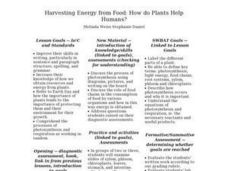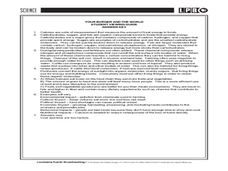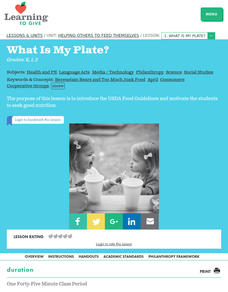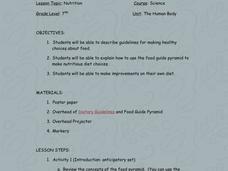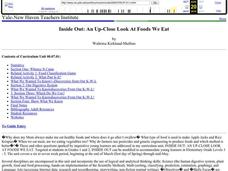Curated OER
Measuring Calories in Food
Learners measure the amount of calories in food. In this food energy lesson, students discuss what a calorie is, how our bodies use a calorie, and how many we need. Then, learners use a calorimeter to calculate the amount of energy in a...
Curated OER
Food for Thought
Fifth graders explore the brain and what is needs. In this biology lesson plan, 5th graders will work on a series of activities that will allow them to learn about the brain, its parts, and the best foods to eat for their brain.
Curated OER
Soil in My Food Web
Fourth graders understand the importance of soil to the food web. In this food web lesson, 4th graders create various food webs beginning with soil using yarn and name cards. Students write about the importance of soil to one organism.
Curated OER
Forest Food Webs
Students consider the interdependency of life in a temperate forest by studying selected organisms from an Asian temperate forest and creating a food web.
Curated OER
Sweet Science: How Sugar Molecules are Manipulated in Candy Making
Students investigate how heat affect sugar solutions. In this science lesson, students compare the sweetness of different types of sugars. They research the development of sugar and create a timeline.
Curated OER
From the Farm to Your Table: Where Does Our Food Come From?
Students discover where the food they eat comes from. Using maps, they identify the agricultural areas of the United States and the products that are grown in each area. Using the internet, they research how food gets to America from...
Curated OER
Dietary Guidelines/Food Pyramid
Learners study the recommended Dietary Guidelines for Americans and the Food Guide Pyramid. They discuss the foods they eat, watch a video about the Food Pyramid and examine actual foods portioned out into recommended serving sizes.
Curated OER
Making Healthy Food Choices
Students examine importance of making healthy food choices, discuss connection between what we eat and healthy body and heart, discriminate between healthy food or "heart-smart choices," and "junk food," and plan healthy meal or snack.
Curated OER
Nutrition Lesson Plan
Second graders complete a survey as class answering the question: "Did you eat breakfast this morning?". They place a tally mark in the column that best represents their answer. They then discuss the results in the graph.
August House
Go to Sleep, Gecko
Use this multidisciplinary lesson to delve into these subjects: English language arts, math, science, drama, and character education. After reading, discussing, and making interpretations about Go To Sleep, Gecko!: A Balinese Folktale by...
Curated OER
Harvesting Energy from Food: How do Plants Help Humans?
Beginning botanists view slides of plant vascular tissue. They watch Magic School Bus Gets Planted, which you can find online, and then write a summary of what they have learned about plants. This lesson could be used with upper...
Curated OER
Food Math
Pupils brainstorm healthy food choices. In this health science lesson, students calculate how much of each food group they need daily. They plan a menu based on the "MyPyramid for Kids" food guide.
Curated OER
Fast Food: You Can Choose!
Learners research the nutritional value of fast food. They assess which fast foods are best and worst to eat. They organize their data into tables and graphs and explain their findings to other students.
Curated OER
What Is the Food Pyramid?
Students are introduced to the USDA Food Pyramid. They discuss good nutrition and work cooperatively with the class to assemble a food pyramid puzzle.
Curated OER
Rice Nutrition
Third graders investigate nutrition by researching rice. For this food lesson, 3rd graders read about the healthy aspects of rice and how many people in the world eat it. Students read nutrition labels and discuss the different energy...
Curated OER
Give me Food!
Young scholars study the food guide pyramid and use it to create their own eating program.In this health lesson students visit websites to calculate their BMR, activity level and weight then create a nutrition plan
Curated OER
Investigating the Food Pyramid
Students examine how the food pyramid is an important nutritional tool. They classify foods and compare the number of servings per group that are necessary for maintaining good health by placing empty food containers in grocery bags.
Curated OER
Nutrition
Seventh graders describe the healthy choices about food. In this nutrition lesson, 7th graders use the food pyramid to help them in making nutritious choices. Students discuss their diet and talk about how it can be improved.
Curated OER
Familiarizing Students with the 5 Food Groups
Students review a variety of foods and classify them into food groups. They identify the benefits of each food group to our bodies and consider how deficiencies of these groups affect humans. They sort pictures, view a video and write...
Curated OER
Food Pyramid Menu
Young scholars analyze the food pyramid. For this food pyramid lesson, students evaluate their nutritional needs. Young scholars record their eating habits and determine if their food choices were healthy.
Curated OER
THE FOODS WE EAT
Students discuss the five food groups and the seven basic nutrients. They decorate Food We Eat booklet pages with pictures of foods found on background, rubber stamp and animation tools in KidPix. (Booklet has a page for each food group.)
Curated OER
Inside Out: An Up-Close Look At Foods We Eat
Fourth graders identify the origins of meats and vegetables consumed by humans on a daily basis. They classify foods (meats, dairy products, grains...) and create a food pyramid.
Curated OER
Food Web Mystery
Students describe typical marine food webs, and explain why food is generally scarce in the deep-ocean environment. They discuss reasons that seamounts may support a higher density of biological organisms than would appear to be possible.
Curated OER
Yeasts and Molds: Food Science, Bacteria, Fungi
In this instructional activity learners will consider the characteristics and nature of yeast and molds in order to help them understand how these microorganisms affect food production.












